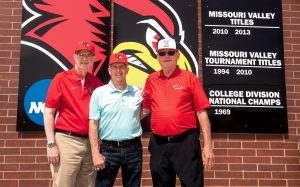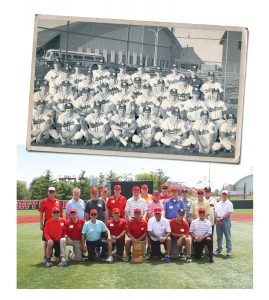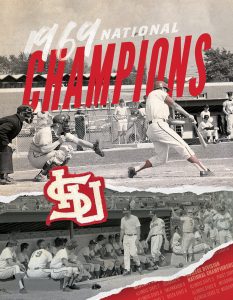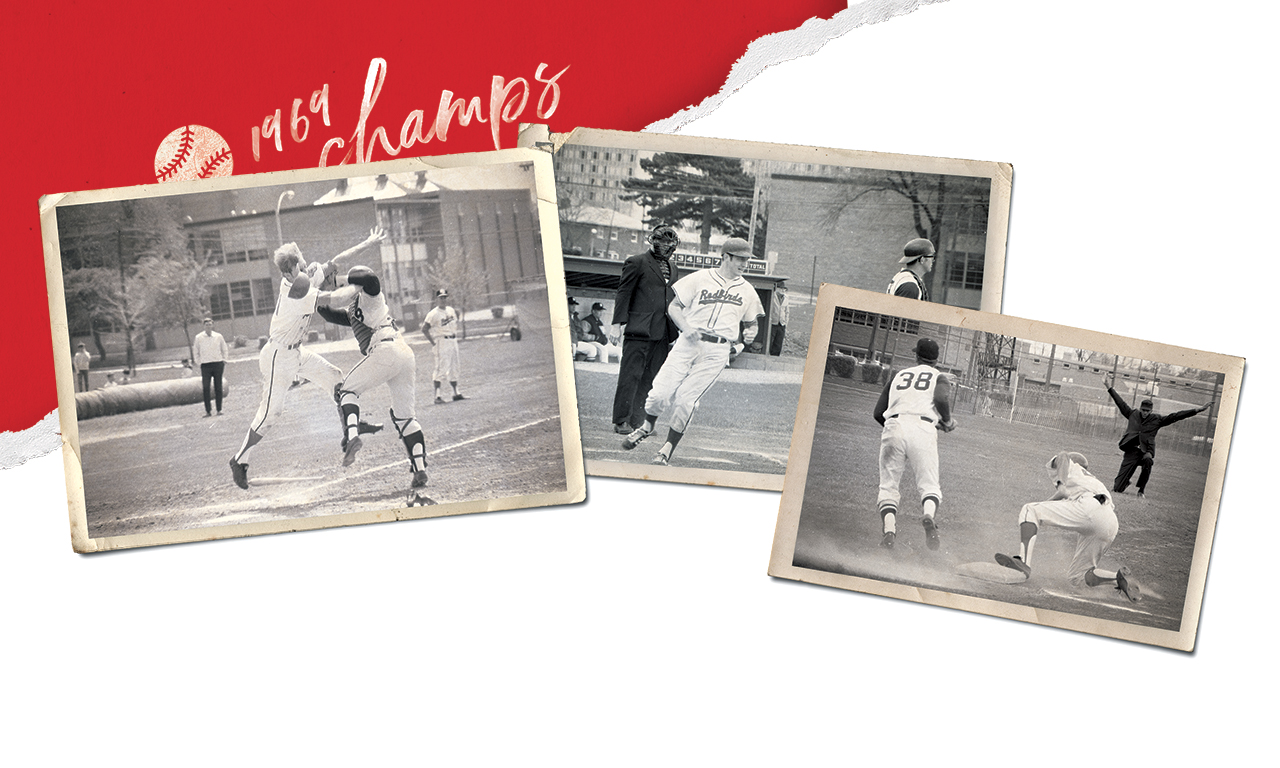Lee “Buzz” Capra has a cherished baseball memory. It brings a smile to his face and warmth to his heart. It lifts him up and takes him back in time. It makes 50 years feel like 15 minutes.
Capra ’73 played Major League Baseball, but that’s not what this is about. It’s better than that.
Appears In
Different kind of cure: Alum’s academy teaches critically ill children
Directors chosen for Alumni Association
Civic engagement: Redbirds strong advocates for higher education
Meeting the national need for teachers
Where are they now? Roger Cushman
Redbirds capture MVC All-Sport Trophy
How we met: Arielle De Lisle and Kyle Cadagin
Tennis coach earns 100th victory at ISU
Golfer, coach top MVC
Pause for applause
Legacy family event
Scholarship makes all the difference to theatre major from Texas
Baseball team in NCAA tournament
Better and brighter: Bone Student Center revitalized
Stay connected to ISU
ISU surpasses $150 million Redbirds Rising campaign goal; campaign to continue through June 2020
Redbird Softball signs Team IMPACT recruit
Redbird uses hair to create, teach and inspire
Heart strings: ISU music program reaches out to Bloomington-Normal youth
Redbird legacy: Family’s Redbird ties extend across 3 generations
A few years before leading the National League in earned run average with the 1974 Atlanta Braves, Capra was a star pitcher at Illinois State. He helped the Redbirds win the 1969 College Division World Series, still the only team national championship in ISU history.
Five decades take a toll on shoulders, hips and knees. They have been unable to disturb the joy Capra got from winning that title with his closest friends.
“It will always be among the fondest memories of my life, going away to college and playing on that team,” Capra said. “There is a lot of hype at the big league level, but there are so many great players up there. That 1969 title was something you basically only have four years to accomplish. Freshmen weren’t eligible back then, so it was really three years.
“Everything has to fall in place and you have to have the right mix of players and everything. “It’s something that remains embedded for the rest of your life. We had guys who just loved the game,” Capra said. “We weren’t getting paid a dime. There was a purity to the whole thing.”
Keep in mind Capra went 16-8 for the 1974 Braves, throwing 11 complete games. A year earlier, he was on the 1973 New York Mets in the National League Championship Series. He was a teammate of baseball immortals Willie Mays with the Mets and Hank Aaron with the Braves.
Still, the 1969 Redbirds trump it all.
“It will always remain in my heart,” Capra said. “We had every kind of personality on that team. You name it. We were a pretty close-knit bunch. It wasn’t like you suit up in the locker room, play the game and that’s it. We hung out off the field as well.”
The Redbirds went 33-5 under head coach Duffy Bass ’50, M.S. ’51“I don’t remember the losses,” Capra saidand swept through the College World Series with three straight wins. ISU beat Puget Sound and host Southwest Missouri State (now Missouri State) twice in the four-team event in Springfield, Missouri. The Redbirds won 5-3 over the Puget Sound team with two future big leaguers in pitcher Rich Hand and shortstop Mick Kelleher.
“We had heard all about Rich Hand and how good he was,” said Jim Brownlee ’70, M.S. ‘74, a junior third baseman who later became ISU’s head baseball coach. “They had a layover in the St. Louis airport and he was playing some arcade game and got a blister on his finger. He couldn’t throw his slider and we just lit him up.”

ISU next slipped past Southwest Missouri State, 6-5, in the double elimination tournament. The Bears won their ensuing game to earn another shot at ISU, but the Redbirds rolled to a 12-0 victory to win the title. It led to a celebratory parade in Bloomington-Normal on June 6, 1969.
“It’s such a bond,” Brownlee said. “The thing that really sticks with you is that it’s something that doesn’t happen often, and I don’t think anybody in our group ever took it for granted. To win that last game of the year, to win the national championship…that has kept us close through the years.”
First baseman Tom Klein ’73 was the Most Valuable Player of the World Series, collecting seven hits in 13 at bats. The Redbirds got solid pitching performances from Capra, Bob Graczyk and Paul Sperry ’70 after also sweeping their way through the regional tournament at Cleveland, Mississippi.
It was a dominant run in what is now NCAA Division II, with larger schools at the time classified as the University Division. ISU prevailed despite losing star center fielder Guy Homoly ’70 to a broken leg late in the regular season. An All-American in baseball and football, Homoly later was drafted by baseball’s San Francisco Giants and the Cleveland Browns of the National Football League.
Mike McCuskey ’70, L.L.D. ’03, will tell you Homoly was “really the most valuable player on the team.” There is reason to believe him, and not just because McCuskey has served as chairman of Illinois State’s Board of Trustees and is in his 31st year as a judge.
In 1969, the ISU junior was a student manager, quasi assistant coach and liaison/arbiter between the players and Bass. “I started out as a recruited, sore-armed, left-handed pitcher who couldn’t get the ball over the plate,” McCuskey said.
That led to Bass finding him an alternate role.
“Duffy called me the Road Secretary. That was the Major League term for it,” McCuskey said. “That was the guy who took care of getting the rooms and everything on the road. That’s sort of what it ended up being.”
“I became the person that everybody came to with a problem or a complaint. I was the guy who would get on Duffy’s good side and get Duffy to do whatever was in the best interest of the team. That was my job.”
Brownlee was unsure what his role would be. He returned to ISU as a 22-year-old junior in the fall of 1968 after serving in the Marine Corps. Bass told Brownlee early on that he likely would not be able to play because of the talent now on the team. He sent Brownlee to the junior varsity field and he performed well, earning a spot on the varsity. Bass then said he was unlikely to make the spring trip.

Brownlee did, however, and helped ISU go undefeated down south.
“That’s when we knew we had something special,” Brownlee said. The “Road Secretary” agreed.
“That’s not easy to do,” McCuskey said of the 9-0 spring trip. “It showed how good we were, and it got the team closer together.”
Among the closest were Capra and Klein, who had played against one another in the Chicago area in high school. Capra said it is natural to “buddy up with somebody you know,” and they did.
Capra chose ISU after also being recruited by Illinois. “They were going to redshirt me, and Illinois was so big,” Capra said. “I went and looked at the ISU campus and I just felt comfortable going there.”
There were no full rides at Illinois State at the time. Capra received some money for books, and also had what he called “a meal job.” He watched the playground at nearby Epiphany School in Normal over noon hour, and in return got a lunch there. Then it was back to campus and his next class.
McCuskey said players were also hired part-time as “the fence crew.” The outfield fence at ISU’s home field was a snow fence. It had to be moved at different times throughout the year so that physical education classes could be held in the outfield.
“That’s how rural the program was back then,” McCuskey said.
None of that mattered to the players. They had one another…and, of course, baseball.
“Duffy maneuvered all the pieces perfectly,” McCuskey said. “We all interacted and loved each other.”
Nearly all of them are still alive, and many attended a 50-year reunion at ISU in May. They take pride in a season that provided them with championship watches and a lifetime bond.
“It was the best decision I ever made,” Capra said of attending ISU. “Winning that title is so close to my heart, and the friendships I made and the camaraderie we had … it was special.”



